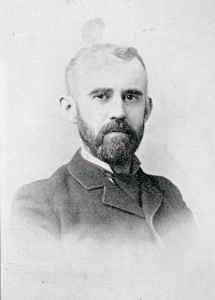
Photo info …
Credit: Indiana Historical SocietyView Source
(Oct. 6, 1846-July 9, 1936). The first mayor born in the city, Thomas Lennox Sullivan lived all his life in various residences in the downtown area, the last 54 years at 503 North Capitol, a house built by his maternal grandfather, Judge , a United States senator. His connections to the city were extensive: his paternal grandfather, Jeremiah Sullivan of Madison, is credited with naming Indianapolis; one of his sons, , also served as mayor (1930-1935, 1939-1943).
Educated in the city’s schools, Thomas Sullivan graduated from Racine College in Wisconsin in 1869, read law in a local firm, attended Indiana Law School, and opened a law practice in 1872. In 1888, he was appointed to a vacancy on the Marion-Hendricks County circuit court. He lost the election to that post later that year by 45 votes but carried Marion County by more than a thousand in a year in which headed the Republican presidential ticket. Such demonstrated popularity brought Sullivan the Democratic nomination for mayor the following year.
Sullivan once remarked that as mayor he had found Indianapolis a country town but that after his term it was becoming a city. His claim has merit. In 1889, he campaigned on a platform of public improvements. As mayor, Sullivan served as one of three city officials on the nine-member, public-private committee organized to draft a new city (adopted in March 1891) that granted unprecedented powers of appointment to the mayor and provided for a board of public works.
Even before the city charter’s adoption, Sullivan had initiated carefully drawn annual department reports (he had inherited a city in debt) and had adopted a systematic approach to the planning and construction of streets and concrete sewers. During his four years, electric trolleys and street lights replaced horsecars and gaslights; the Virginia Avenue viaduct was built, removing a barrier which had divided the city; street signs were put up and the streets renumbered; and the city entered into a contract with the water company on terms more favorable to residents. Despite his record of accomplishments, the Panic of 1893 hurt Democrats, and Sullivan lost his bid for a third term.
After leaving office, Sullivan successfully lobbied the legislature for a compulsory school attendance law (1897) and a popularly elected school board for the city (1899). He lost for judge of the superior court in 1899. He served for many years as president of the city’s sinking fund and as a trustee and then president of the Indianapolis Gas and Coke Company (1907-1936). Sullivan was a 32nd degree Mason as well as a trustee and vestryman for many years at St. Paul’s Episcopal Church.

Help improve this entry
Contribute information, offer corrections, suggest images.
You can also recommend new entries related to this topic.

